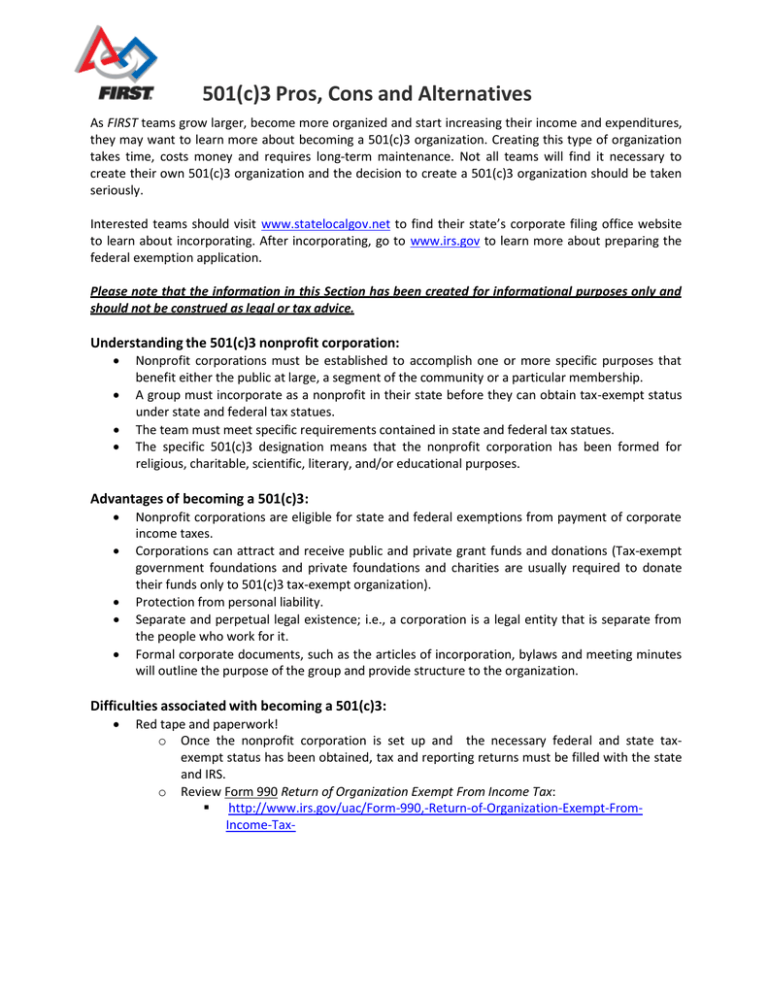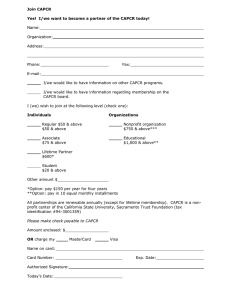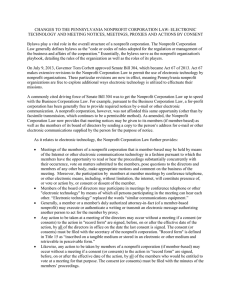501(c)3 Pros, Cons and Alternatives
advertisement

501(c)3 Pros, Cons and Alternatives As FIRST teams grow larger, become more organized and start increasing their income and expenditures, they may want to learn more about becoming a 501(c)3 organization. Creating this type of organization takes time, costs money and requires long-term maintenance. Not all teams will find it necessary to create their own 501(c)3 organization and the decision to create a 501(c)3 organization should be taken seriously. Interested teams should visit www.statelocalgov.net to find their state’s corporate filing office website to learn about incorporating. After incorporating, go to www.irs.gov to learn more about preparing the federal exemption application. Please note that the information in this Section has been created for informational purposes only and should not be construed as legal or tax advice. Understanding the 501(c)3 nonprofit corporation: • • • • Nonprofit corporations must be established to accomplish one or more specific purposes that benefit either the public at large, a segment of the community or a particular membership. A group must incorporate as a nonprofit in their state before they can obtain tax-exempt status under state and federal tax statues. The team must meet specific requirements contained in state and federal tax statues. The specific 501(c)3 designation means that the nonprofit corporation has been formed for religious, charitable, scientific, literary, and/or educational purposes. Advantages of becoming a 501(c)3: • • • • • Nonprofit corporations are eligible for state and federal exemptions from payment of corporate income taxes. Corporations can attract and receive public and private grant funds and donations (Tax-exempt government foundations and private foundations and charities are usually required to donate their funds only to 501(c)3 tax-exempt organization). Protection from personal liability. Separate and perpetual legal existence; i.e., a corporation is a legal entity that is separate from the people who work for it. Formal corporate documents, such as the articles of incorporation, bylaws and meeting minutes will outline the purpose of the group and provide structure to the organization. Difficulties associated with becoming a 501(c)3: • Red tape and paperwork! o Once the nonprofit corporation is set up and the necessary federal and state taxexempt status has been obtained, tax and reporting returns must be filled with the state and IRS. o Review Form 990 Return of Organization Exempt From Income Tax: http://www.irs.gov/uac/Form-990,-Return-of-Organization-Exempt-FromIncome-Tax- • • • • • The corporation is accountable and requires the setting up and balancing of books and bank accounts. A board of directors must be appointed with regular meetings held. The corporation has restrictions on: o paying directors and officers; o dissolution; and o political activates. The State Attorney General has oversight of the corporation. Be selective in how your board of directors is determined. o Consideration of who will control the organization needs to be incorporated into the bylaws. Potential alternatives to forming a 501(c)3: • • • Association with a School o Public school districts are exempt from federal income tax and are eligible to receive tax-deductible contributions. o FIRST teams with quality schools relationships may find it easier to utilize a school account to make purchases for the team. o When a team is receiving sponsorships from the community, be sure checks are appropriately addressed to ensure the team actually receives the funds. o Teams should maintain good, quality communications with the school contact(s) working with the budget in order to be aware of when checks are coming in, reimbursements are made and to prevent problems with a team receiving appropriate funds. Parent Booster Clubs o Can help increase the speed of purchases and reimbursement for a team. o Takes time and money to set up and organize depending on where teams are located. o Requires supportive team parents who are willing to help the team. o Must be carefully managed by the team to ensure the money is accounted for and directed correctly. o Visit Parent Booster Club USA to learn more about Parent Booster Clubs. Other Community Connections o Identify community organizations that may be able to support the team. Some examples may include; Community Foundations; Custodial Accounts at Colleges and Universities; 4-H Programs; and/or Girl Scouts & Boy Scouts Resources for Teams: • • • • • • www.nolo.com – For books and software. www.legalzoom.com – For legal fillings. www.irs.gov – For all forms and instructions. www.statelocalgov.net – For each state’s instructions www.techsoup.org – For discounted software and hardware. “How to Form a Nonprofit Organization” by Anthony Mancuso – For reference and legal forms.



